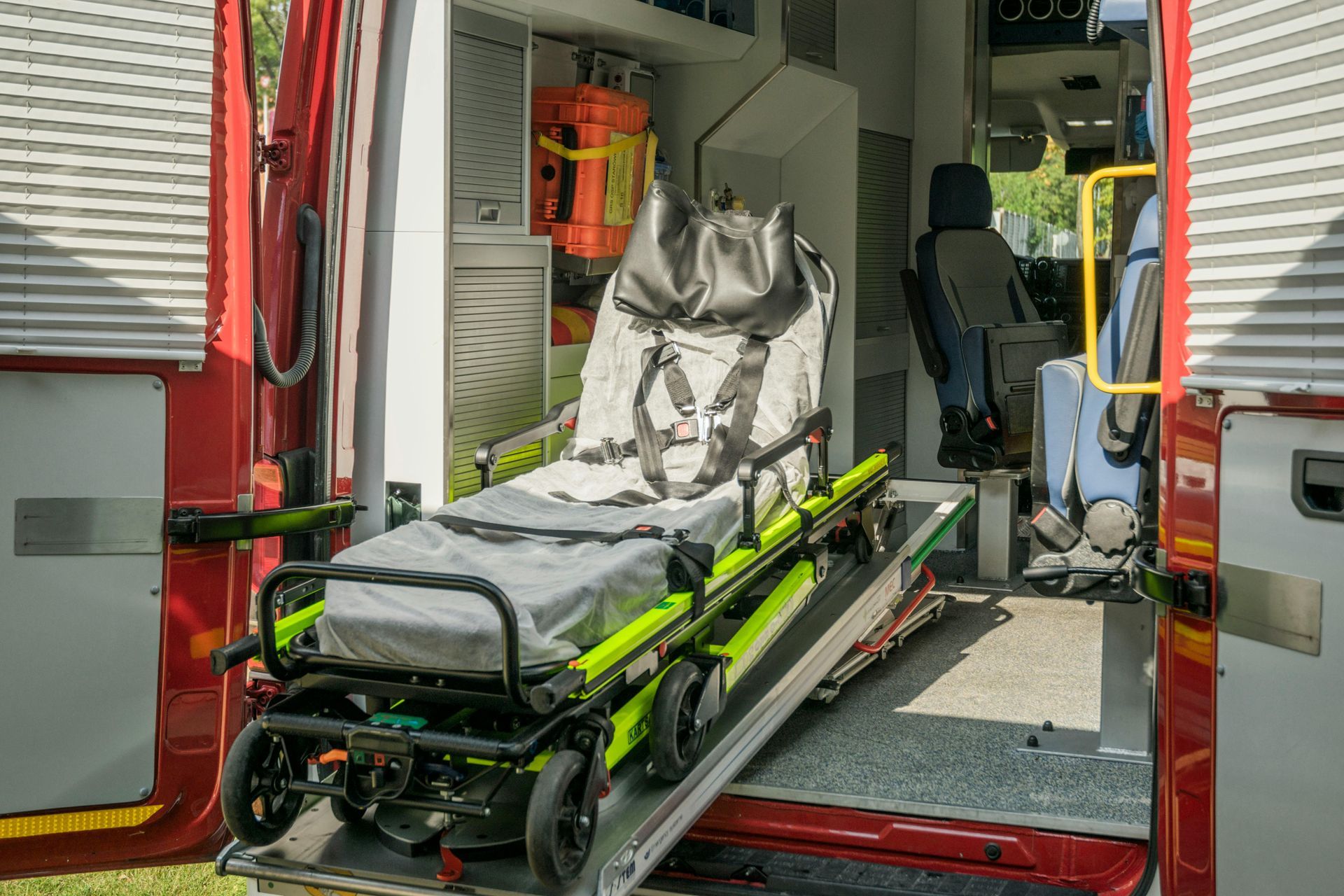Non-Emergency Long Distance Medical Transportation: Pros and Cons
Non-emergency medical transportation (NEMT) plays a vital role in ensuring that individuals with mobility limitations, chronic illnesses, or disabilities can access essential healthcare services, particularly for long-distance medical appointments. Unlike emergency cases, where immediate attention is prioritized, those with non-urgent medical needs often struggle to arrange transportation for distant medical appointments or transfers. NEMT services serve as a crucial bridge, offering safe and reliable transportation for patients, regardless of their location. For patients requiring specialized care during transportation, such as those confined to stretchers, NEMT services provide invaluable support by ensuring comfortable and safe travel to transfer them closer to their families or to received needed care from facility out of states. With trained professionals and equipped vehicles, NEMT services prioritize the well-being of patients, offering peace of mind to both patients and their families during transit.

Why NEMT is Important For Distance Medical Transportation
and Stretcher Transportation for Non-urgency Cases
Non-emergency long distance medical transportation plays a vital role in ensuring the well-being and comfort of individuals requiring medical care or assistance while traveling. Whether it's for medical appointments, visits to specialized clinics, or even family events, this mode of transportation provides a safe and reliable option for those who are unable to travel by conventional means. In this article, we will explore the pros and cons of non-emergency long distance medical transportation, shedding light on its benefits and potential drawbacks.
Bridging the Gap: The Importance of NEMT for Distance Medical Transportation
Non-emergency medical transportation (NEMT) plays a crucial role in ensuring that individuals with mobility limitations can access essential healthcare services, especially for long-distance medical appointments. While emergency cases often receive immediate attention, individuals with non-urgent medical needs face challenges in arranging transportation for distant medical appointments. NEMT services bridge this gap by providing safe and reliable transportation for patients, ensuring they can receive timely medical care regardless of their location.
Ensuring Comfort and Safety: The Significance of Stretcher Transportation for Non-Urgency Cases
For patients with non-urgent medical conditions who require specialized care during transportation, such as those confined to stretchers, NEMT services offer invaluable support. Stretcher transportation ensures that patients can travel comfortably and safely to medical appointments, therapy sessions, or other healthcare facilities. By providing trained professionals and equipped vehicles, NEMT services prioritize the well-being of patients, offering peace of mind to both patients and their families during transit.
Beyond Emergency Care: Expanding Access to Non-Urgency Cases
While emergency medical transportation often receives the spotlight, NEMT services are equally essential for non-urgent medical cases. These services extend access to healthcare for individuals with chronic illnesses, disabilities, or mobility limitations, ensuring they can access medical appointments and treatments regardless of urgency. By focusing on non-urgent cases and providing specialized transportation solutions like stretcher transportation, NEMT services fill a critical need in healthcare accessibility, ultimately improving outcomes for patients across various medical scenarios.
Pros of Non-Emergency Long Distance Medical Transportation
1. Accessibility and Convenience
Non-emergency long distance medical transportation offers an accessible and convenient solution for individuals with medical conditions or limited mobility. This mode of transportation ensures that patients can comfortably reach their desired destinations without facing the challenges of public transport or driving themselves. Professional drivers with expertise in medical transportation provide personalized care and assistance throughout the journey, accommodating the specific needs of each passenger.
- Patients with limited mobility or medical conditions can travel comfortably and safely.
- Avoids the challenges of using public transportation or driving oneself.
- Professional drivers provide personalized care and assistance tailored to each passenger's needs.
2. Comfort and Safety
One of the significant advantages of non-emergency long distance medical transportation is the focus on comfort and safety. These vehicles are equipped with specialized medical equipment, such as stretchers, wheelchair lifts, and oxygen supplies, ensuring that passengers receive the care they require during the journey. The professional drivers undergo rigorous training to handle medical emergencies if the need arises, ensuring the safety and well-being of the passengers.
- Specialized vehicles are equipped with essential medical equipment for passenger care.
- Professional drivers are trained to handle medical emergencies, ensuring passenger safety.
- Comfort and safety are prioritized throughout the journey.
3. Reliability and Timeliness
Non-emergency long distance medical transportation services are known for their reliability and timeliness. Unlike public transportation or taxis, these services operate on a scheduled basis, ensuring that patients arrive at their destinations promptly. This reliability is particularly crucial when individuals need to attend medical appointments, ensuring they do not miss crucial consultations or treatments due to transportation delays.
- Scheduled services ensure prompt arrival at destinations, avoiding transportation delays.
- Ideal for individuals with medical appointments or treatments that require punctuality.
- Reliable transportation reduces the risk of missing important medical consultations or treatments.
4. Door-to-Door Service
Non-emergency long distance medical transportation offers door-to-door service, providing convenience and peace of mind to patients and their families. The service eliminates the need for patients to arrange transportation to and from medical facilities, reducing stress and logistical challenges. Professional drivers assist with boarding, securing the passengers safely, and ensure a smooth transition from the patient's location to the desired destination.
- Door-to-door service eliminates the need for patients to arrange transportation.
- Reduces stress and logistical challenges for patients and their families.
- Professional drivers ensure a smooth and safe journey from pick-up to drop-off.
5. Bed-to-Bed Transfers
Bed-to-bed long distance medical transportation is a specialized service offered by long-distance medical transportation providers, ensuring seamless transit for patients from their current location to their destination medical facility. This comprehensive approach prioritizes the comfort and safety of patients throughout the entire journey, catering to individuals with mobility limitations, chronic illnesses, or disabilities. With trained professionals overseeing the entire transportation process, patients can rest assured that their needs are attended to every step of the way.
- Personalized Care: Bed-to-bed transportation offers personalized care tailored to the specific needs of each patient, ensuring their comfort and well-being during transit.
- Continuous Monitoring: Throughout the journey, patients receive continuous monitoring and assistance from trained medical staff, ensuring any medical needs or emergencies are promptly addressed.
- Efficient Coordination: Long-distance medical transportation providers coordinate logistics seamlessly, including scheduling, route planning, and communication with medical facilities, to ensure a smooth and efficient transport experience for patients and their families.
6. Comfortable and Spacious Vehicles
The vehicles used in non-emergency long distance medical transportation are designed to provide maximum comfort and spaciousness for passengers. These vehicles are equipped with features such as climate control, comfortable seating, and ample legroom, ensuring a comfortable journey. The spaciousness allows passengers to travel with their companions or medical assistants, providing emotional support and assistance throughout the trip.
- Vehicles are designed for maximum passenger comfort and spaciousness.
- Climate control, comfortable seating, and ample legroom enhance the travel experience.
- Passengers can travel with companions or medical assistants for emotional support and assistance.
Cons of Non-Emergency Long Distance Medical Transportation
1. Cost
One of the primary drawbacks of non-emergency long distance medical transportation is the associated cost. These specialized services often come at a higher price compared to conventional modes of transportation. The cost can be a significant factor, particularly for individuals who require frequent transportation or have limited financial resources. It is essential to consider the financial implications and explore alternative options before opting for this service.
- Non-emergency long distance medical transportation can be more expensive than conventional transportation.
- Cost is a significant factor, especially for individuals with limited financial resources.
- Patients should consider the financial implications and explore alternative options before choosing this service.
2. Limited Availability
The availability of non-emergency long distance medical transportation services may vary depending on the location. While larger cities and metropolitan areas usually have more options, individuals residing in remote or rural areas may find it challenging to access these services. Limited availability can pose difficulties in securing transportation during peak times or when there is high demand for medical transportation services.
- Availability of non-emergency long distance medical transportation services may be limited in remote or rural areas.
- Individuals in such areas may face challenges in accessing these services.
- Difficulty in securing transportation during peak times or high demand situations.
3. Scheduling Constraints
Non-emergency long distance medical transportation operates on a scheduled basis, which may result in setting a specific scheduling times for patients pickup. The predetermined schedules always aligned with the exact timing of medical appointments or needed time for the patient to be at the destinations so it doesn't leading to potential conflicts. It is crucial for patients to plan ahead and book long distance medical transportation services well in advance to ensure availability and avoid any scheduling issues.
- Predetermined schedules of non-emergency long distance medical transportation can be align with travel plans, just needs precious plans.
- Patients may need to plan ahead and book transportation well in advance.
- Avoid potential conflicts and scheduling issues by planning ahead and ensuring availability.
4. Lack of Flexibility
Sometimes non-emergency long distance medical transportation services may lack the flexibility to make spontaneous stops or changes to the itinerary. Especially if they have to take patient for an timely appointment. The predetermined routes and schedules may limit the ability to accommodate specific preferences or unexpected circumstances that may arise during the journey. Patients should be aware of this limitation and plan accordingly to minimize any inconvenience. However, it is always advisable to request necessary accommodations, as many long-distance medical transport providers are willing to accommodate their patients' needs as their top priority.
- Non-emergency long distance medical transportation may have limited flexibility for spontaneous stops or changes in itinerary.
- Predetermined routes and schedules may not accommodate specific preferences or unexpected circumstances.
- Patients should plan accordingly and be aware of the limitations to minimize inconvenience.
5. Reliance on External Factors
Non-emergency long distance medical transportation services are subject to external factors such as traffic conditions, weather, and unforeseen events that may impact the overall travel experience. Delays or disruptions may occur due to these factors, affecting the timeliness and convenience of the transportation service. While service providers strive to minimize such occurrences, it is essential for patients to consider and plan for potential contingencies.
- Non-emergency long distance medical transportation services can be affected by external factors like traffic and weather.
- Delays or disruptions may occur, impacting the timeliness and convenience of the service.
- Patients should consider potential contingencies and plan accordingly to minimize disruptions.
In conclusion, non-emergency long distance medical transportation offers numerous benefits, including accessibility, convenience, comfort, and safety. It provides a reliable and timely solution for individuals with medical needs, ensuring they can reach their destinations with ease. However, it is important to consider the associated costs, limited availability, scheduling constraints, at times lack of flexibility, and reliance on external factors. By weighing the pros and cons, individuals can make an informed decision when considering non-emergency long distance medical transportation for their specific needs and circumstances.
FAQ
Q1: What are the pros of non-emergency long distance medical transportation?
A1: The pros of non-emergency long distance medical transportation include accessibility and convenience for patients with limited mobility or medical conditions, comfort and safety with specialized vehicles and trained drivers, reliability and timeliness with scheduled services, and door-to-door service for convenience and peace of mind.
Q2: What are the cons of non-emergency long distance medical transportation?
A2: The cons of non-emergency long distance medical transportation include the higher cost compared to conventional transportation, limited availability in remote or rural areas, scheduling constraints that may not align with medical appointments, lack of flexibility for spontaneous stops or changes in itinerary, and reliance on external factors such as traffic and weather.
Q3: How can non-emergency long distance medical transportation be more expensive?
A3: Non-emergency long distance medical transportation can be more expensive than conventional transportation due to the specialized services and equipment provided, as well as the personalized care and assistance offered by professional drivers.
Q4: What should patients consider before choosing non-emergency long distance medical transportation?
A4: Patients should consider the financial implications of the service, explore alternative options, and plan ahead to ensure availability and avoid scheduling conflicts. They should also be aware of the limitations in flexibility and potential disruptions due to external factors, and plan accordingly to minimize inconvenience.






